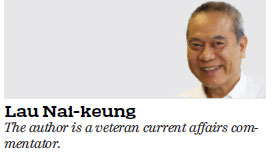'Hong Kong people' could be a dangerous concept

I happened to read my last piece in this column as it was printed, which I seldom do, and was surprised to find that the term I used, Hongkongers, was changed to "the Hong Kong people" throughout the piece.
I would like to clarify that I certainly did not mean to say "the Hong Kong people". I do not believe there is a "Hong Kong people" and I strongly oppose any suggestion that it exists.
"A people" is a political concept. It is a plurality of persons considered as a whole, as is the case with an ethnic group or nation. Collectively, for example, the contemporary Frisians and Danes are two related Germanic peoples, while various Middle Eastern ethnic groups are often linguistically categorized as Semitic peoples.
Various states govern, or claim to govern, in the name of the people. Both the Roman Republic and the Roman Empire used the Latin term Senatus Populusque Romanus (the Senate and People of Rome). This term was fixed to Roman legionary standards, and even after the Roman emperors achieved a state of total personal autarchy, they continued to wield their power in the name of the Senate and People of Rome.
The claim that there is a Hong Kong people is dangerous. Article I of the United Nations Charter provides that: "All peoples have the right to self-determination. By virtue of that right they freely determine their political status and freely pursue their economic, social and cultural development." This right to self-determination is recognized as a right of all peoples in the first article common to the International Covenant on Civil and Political Rights and the International Covenant on Economic, Social and Cultural Rights.

Our nation is called the People's Republic of China for a reason. It represents, and therefore presupposes, a Chinese people. Chinese, as a whole, are a people. As a people, we have the right to freely determine our political status and freely pursue our economic, social and cultural development. We value this right, but we have to be careful how we define "our people".
The first thing separatists do is to claim that they are a distinctive people, and that it is unjust to group their people together with others who happen to share the same piece of land. That's also what some people in Hong Kong are trying to do, although they are all Chinese and immigrants from outside of Hong Kong.
Hongkongers and the Hong Kong people are two different things. We can also call them people in Hong Kong, or Hong Kong residents. Likewise, there is no such thing as a Hong Kong citizen because many Hongkongers are nationals of foreign countries.
This confusion may have to do with our mistaken attempt to distance ourselves from the early years of our nation, a trend that President Xi Jinping has warned us against. As you can see, the word people has a political meaning from the first day it was born. The Chinese word for people is renmin, a Marxist-Maoist political concept that embodies both rights and responsibilities. If we remember that, we wouldn't be using the word people lightly.
The phrase "Hong Kong people" reinforces the concept that there exists a distinct ethnic group in Hong Kong, while terminology such as Hongkongers is less objectifying. Similarly, we would not call New Yorkers "the New York people", which just does not sound right.
Permanent residents of Hong Kong consist of different ethnic groups and people from around the world. There are Han-Chinese, Southeast Asians, Anglo-Saxons and many others. Many Hong Kong residents who are Chinese ethnically nonetheless are holders of non-PRC passports. Some were born and raised here, many were immigrants. Those permanent residents who are also Chinese nationals will eventually enjoy the same rights and responsibilities as with the other Chinese people, or renmin.
Words are powerful. They have the ability to summon reality into being. We must resist using words that will suggest things that do not exist. When others use them, we have to politely point out that they should not and state why.
(HK Edition 11/07/2017 page7)
Today's Top News
- Opposition moves to impeach Lai
- China to continue anti-dumping duties on EPDM imports
- Trump says war with Venezuela remains possible -- NBC News
- China urges Japan to stop challenging intl bottom line with its nuclear ambitions
- US arms sales to Taiwan a dangerous gambit: Editorial flash
- Taiwan opposition lawmakers announce plan to impeach Lai Ching-te






























